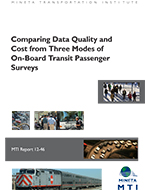- 408-924-7560
- mineta-institute@sjsu.edu
- Donate
Comparing Data Quality and Cost from Three Modes of On-Board Transit Passenger Surveys
This report presents the findings from a research project investigating the relative data quality and administration costs for three different modes of surveying bus passengers that produce results generalizable to the full passenger population. The three modes, all of which used survey methods distributed or administered onboard the transit vehicle, were: self-complete paper surveys, self-complete online surveys, and interviewer-assisted tablet-based surveys. Results from this study indicate several implications for practitioners choosing a survey mode. First, and most importantly, the analysis reinforces the point that there is no single, best survey mode. The choice of mode must depend on an agency’s priorities for what questions most need to be answered, what population groups are most important to represent, and exactly how the agency chooses to define concepts like a “complete” survey or a “usable” address. Findings suggest several general recommendations for current survey practice: (1) online surveys administered via an invitation distributed on the transit vehicle are not a good option; (2) old-fashioned, low-tech paper survey may still be the best option for many bus passenger surveys; (3) changes in survey results that accompany changes in survey methods should be interpreted with caution; and (4) using a new survey method, especially one relying on more complex technologies, may create unexpected glitches.
ASHA WEINSTEIN AGRAWAL, PhD
Dr. Agrawal is director of the MTI National Transportation Finance Center and also an associate professor of urban and regional planning at San José State University. Her research and teaching interests in transportation policy and planning include transportation finance, travel survey methods, and bicycle and pedestrian planning. She also works in the area of planning and transportation history. She has a BA from Harvard University in folklore and mythology, an M.Sc. from the London School of Economics and Political Science in urban and regional planning, and a PhD from the University of California, Berkeley, in city and regional planning.
STEPHEN GRANGER-BEVAN
Mr. Granger-Bevan is a Master of Urban Planning student at San José State University. His research interests center on transportation economics and behavioral choices influenced by transportation and land use planning decisions. Prior to moving into the planning sector, he worked for six years as a business analyst in the financial sector. He currently works for the San Francisco Bay Area Metropolitan Transportation Commission and holds an undergraduate MChem in chemistry from Oxford University.
GREGORY NEWMARK, PhD
Dr. Newmark is a practicing transportation planner and researcher. His professional experience extends across private, public, and non-profit sectors in the US and abroad. His work focuses primarily on two areas: the intersection of land use, transit provision, and travel behavior, and on methods financing public transportation. Dr. Newmark has published widely on a range of topics from parking in Prague to streetcars in San Francisco to tailpipe emissions in Tel Aviv. He is active in developing future generations of planners and has been an adjunct lecturer in master’s programs at San José State University, DePaul University, and, currently, the University of Chicago. He is active with the Transportation Research Board, where he sits on several research panels and chairs the International Subcommittee of the Rail Transit Committee. In addition to being a research associate of the Mineta Transportation Institute, Dr. Newmark is a research fellow at the Chaddick Institute of Metropolitan Development and a senior research associate at the Center for Neighborhood Technology (CNT). Previous to his current role at CNT, Dr. Newmark served as a principal analyst at the Regional Transportation Authority in Chicago. He holds a PhD in city and regional planning from the University of California, Berkeley, an MSc in city and regional planning from the Technion - Israel Institute of Technology, and a BA in history and international studies from Yale University.
HILARY NIXON, PhD
Dr. Nixon is an associate professor of urban and regional planning at San José State University. Her research and teaching interests in environmental planning and policy focus on the relationship between environmental attitudes and behavior, particularly with respect to waste management and linkages between transportation and the environment. She holds a BA from the University of Rochester in environmental management and a PhD in planning, policy, and design from the University of California, Irvine.
-
Contact Us
San José State University One Washington Square, San Jose, CA 95192 Phone: 408-924-7560 Email: mineta-institute@sjsu.edu






